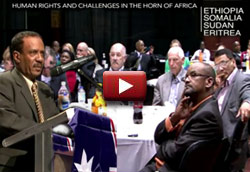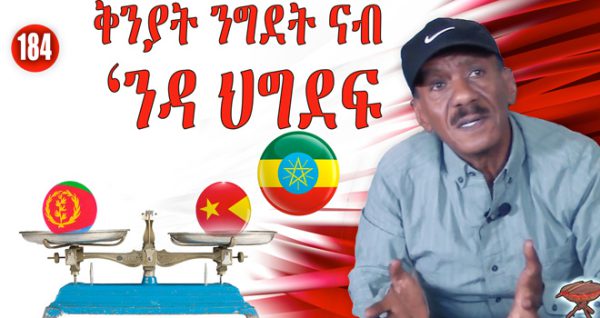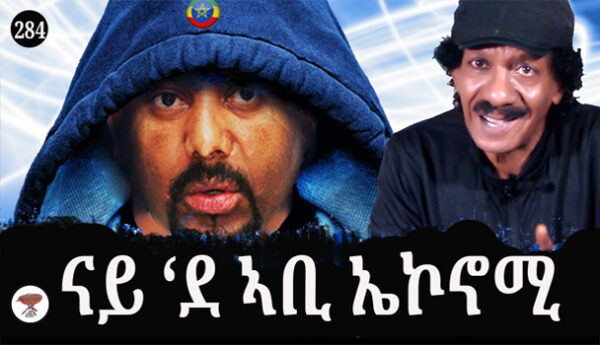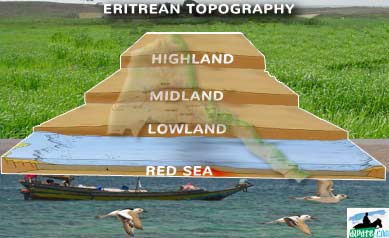Human Rights And Challenges In The Horn Of Africa

1. The Hon. Adam Bandt Federal MP, Cr Grant Miles, Maribyrnong council, her excellence representative of Botswana Ms. HEDDIE GOLDBERG, his Hon. Consul General Of the federal Republic of Somalia, Yanis Hashi; Mr. Chin Tan, Chairperson, VMC; Assistant commissioner Commander Ashley Dickinson Vic Police; Commander Scott Lee AFP; religious and African community leaders and invited guests, members of the African Communities, Elders and children.
2. I wish to acknowledge the elders of the Wurrundjeri people, and the Elders of other Aboriginal communities, past and present…please join me in honouring the people, land and the vibrant spirit of this nation.
3. Please also allow me to pay my respect to my elders, my relatives and friends and compatriots… particularly my dear mother…you might be surprised to know that my speech of today is inspired by her…in fact she kept telling me what to say and how to say it. So, in a way I will be delivering my mother’s speech._____________
4. In a recent article that appeared on AlJazeera, Dr. AbduSattar Qassim says, “Democracy is a culture and not a political decision; the West are skilled in it because it is their daughter and a culmination of their historical development; but us, we have a different historical experience.”
5. Two years ago I was in a Free Speech Forum in Oslo, Norway when a friend introduced me to a Sudanese “human rights activist.” We began to talk and I asked him when he was returning to Sudan. His eyes popped and he told me that he cannot return as long as Omer Al Bashir and his government is in power . Why? You are just a human rights activist! No he said. I had fled the country after the security forces discovered I was passing vital information to human rights organizations about the movements of AlBashir… and of course he implied that he knew everything going on in Sudan and that he risked his life and communicated with many groups, of course human rights groups, as you can imagine. It was too much for me: were you a spy? If what you are telling me is true, then any government would arrest you on charges of treason. I avoided him for the rest of the evening.
6. When I travelled to Ethiopia, I would go to the Hilton Hotel, the best place to meet the who-is-who in Addis Ababa at the time and I would see parking lots full or cars with “Erdata” registration plates. Of course only them and senior officials, businessmen, and women, including visitors with hard currency could afford the place. Here are respectable, selfless people, doctors who work in remote villages giving medical assistance to deprived people, people who came back from digging wells in some remote areas for the villagers… but there were human right activists on a conference, or for meeting, or on a fact-finding mission, or simply there to recruit human rights activists like our Sudanese friend, people who would report on the government secretes, of course that has become a human rights issue.
7. Elsewhere in the cities and villages of the Horn of Africa, most people struggle with day to day life, not really concerned with freedom of expression, or association, or any of the basic human rights that we in this room take for granted.
8. The concept of human rights is relatively new–the West, including Australia which is not West geographically speaking–, it came into being only after WW2 and it only began to develop after all sorts of feudalism, slavery was abolished…at least in its traditional sense–I mean we do not have cotton plantations or thirteen years old boys sleeping under the loom on a dusty floor of a factory– we now have thirteen-year olds being denied education and hope.
9. I have travelled all over the Horn of Africa except Somalia– and who can blame me for avoiding it, at least in the last two-decades. But I do not need to go to Somalia, there is an umbilical cord that ties Somalis with Eritreans, I never felt that I do not know Somalia; probably I met and know more Somalis than any of the other countries of the Horn of Africa. I have also travelled extensively around the world and I visited many countries… and why do I feel you will not be surprised when I say that the happiest enviable people from the Horn of Africa live in Australia.
10. This is my first visit to Australia and since I know almost all Eritreans living in Australia, I have heard a lot about this country and I have read enough, this visit gave me a chance to see firsthand how people live in this country. I was pleasantly shocked by the level of tolerance, freedoms, rights and diversity that I witnessed. I was amazed when I compared the diversity that this country has manufactured over the last few decades (as far as The Horn of Africa is concerned) and the natural diversity that we have in the Horn of Africa–I am not yet sure if it is a blessing or a curse! How did we fail to capitalize on our diversity? How did it turn to be a curse when Australians have brought diversity to their country, willingly they invested on it…heavy investments.?
11. I think the secret is evolution… and some evolutions turn bad, not in Australia… and not the evolution of the concept of human rights.
12. I sometimes wonder and ponder about the right wing rhetoric in my country the USA, some of whom were arguing that some regions cannot handle democracy or human rights. To the uninterested, surface observer, it might seem so. But I was offended: do they really think my people do not want to be free, to enjoy their human rights? Do they mean we can only function when we are ordered around to do things we would rather not do on our own? Do they really think, we love to be oppressed, denied our human rights? That is when I cling to the Universal Declaration of Human rights. And that is when I become disillusioned: do those who try to help us improve our condition by promoting human rights really understand our situation, what really is the crux of the matter? I am not sure most people know this.
13. Our region is part of an area, an area that is so chaotic, and God had to send the most known prophets there: David, Mosses, Noah, Jonah, Job, even one who carried my name, Saleh, Christ, Mohammed and many others. That region is about groups, about communal rights and not about individual rights. That region has been shaped by a millennia of communal life where the interest of the group comes before that of an individual. Religion is supreme and anything that contradicts religious notions and perceptions are really not welcome. That is in my view the main problem.
14.vBut what makes it worse is ignorance: and religious indoctrination has been used for political ends on the believing communities very successfully. Traditions are very entrenched and the resistance to modernity is a tough stance.
15. The other things that is crippling the Horn of Africa is bad governance which has prevented people from evolving–there are still people who go several generation back to trace one’s blood purity, to make sure that a bride or a groom to-be doesn’t have slave ancestry. We still have prevalent use of the term “slave” to dark skinned people… Eritreans use the word “Barya” meaning slave affectionately for a dark skinned person. Ethiopians referred to Mengistu Hailemariam, the ex-leader of Ethiopia who was over-thrown in 1991 as Barya. The belittling and oppression of women is a common phenomenon. FGM is too common, and it is not even proscribed in any religion, it is believed to be inherited from the days of the Egyptian Pharaohs… and it is too common in our part, with the exception of a few places in Ethiopia.
16. Now! How do you educate of such things to a community that travels ten kilometers to fetch a pail of water, if they are lucky the well will not dry up?
17. The challenges are great, and they start with governance. Good governance ushers an era where basic justice is applied. Once that justice is there, people develop faster. Once justice is established, the main crippling enemy is ignorance. And that could be targeted simultaneously with providing basic needs such as water and medicine. Only then we can successfully eradicate all the ills that hinder the joy of maintaining the human rights of people.
18. We have governments that act as feudal lords, and we know the West could not have come up with the evolved Universal Declaration of human rights. It first had to eradicate feudalism in all its forms. The governments of the Horn of Africa are the major impediment to adopting the concept of human rights which many in our region understand to mean, justice. For under a just system, one cannot be denied basic human rights.
19. Over the last twenty years or so, Somalis were reaching at each other’s throat despite the fact that Somalis speak basically one language and are Muslims. Why? Bad governance that forces everyone to seek protection from those close to him, everyone on his own brought clan warfare to the fore. Hopefully, Somalia is going fast towards normalcy and I am confident that they will succeed because they are resourceful people. Even in the middle of fierce wars, some entrepreneurs managed to provide an impressive telecommunication survices, away from government regulations and assistance, impressive banking (mainly transfer) system, they created security outfits when the police apparatus collapsed.
20. Of course they created, the technical, a pick up mounted machine guns that challenged tanks. As bad as it is, it is innovation, even if it is crude. Good governance will certainly improve the human rights situation is Somalia, provided Somalis defend their land from modern day Messiahs, people who seem dead certain of who goes to hell and who is destined for heaven. People like AlShabab who think they are the Ambassadors of God on earth and destroy the rich Sufi heritage of Somalia. Those kind of claimants to divinity are the only risk that Somalis have to take care of– and I am not denying they are the product of both bad governance and intolerance exported by those who think they own the truth about everything, the fanatics.
21. Ethiopia seems to be doing relatively well compared to the other countries of the region, but the flashy economic development might widen the gap between the poor and the rich– and that is a disaster waiting to happen in a country that is reproducing in an alarming speed–eighty-something million souls! But if Ethiopia suffers from poverty, I assure you it is not God’s mistake, He has bestowed on Ethiopia a fertile land, lots of water, a rich multi-cultural society and other endowments. Economic disparities might create a risk of arousing ethnic tensions.. and thus the erosion of the little relative improvements on human right.
22. Sudan is the perfect example of a bad governance–the Salvation Front government is corrupt to the core. The elite of Sudan are playing the Sudanese social and regional groups against each other. When I was young, the Sudanese were peaceful to the extent we used to make fun of their character, avoiding any confrontation. We used to make jokes about that. Thanks to the NIF, the Sudanese are fully militarized and the Sudan which used to be safe haven for all the region’s refugees has now become hell on earth. It has become the center of operation for human traffickers, hostage takers, and criminals who have established a lucrative body part trade.
23. South Sudan does not fare any better when it comes to fragility of the system; ethnic strife and conflicts have ravaged the young nation from day one. The two governments could not even agree on how to exploit the oils that is the main source of income… my knowledge about South Sudan, regarding the situation of human rights is scanty, but all the ingredients for the violation of human rights are there: an arrogant government, a trigger-happy army and warrior culture. There, I wish them luck.
24. Now I come to my beloved Eritrea; if my heart would allow me, I would have claimed I am from any other country but Eritrea: the embarrassment I feel due to the ugliness of the governance is like nothing the world has seen.
25. I have a relative who has been serving (sometimes carrying a gun and running from one battle to another, sometimes building roads, sometimes tending to a general’s farm or building a house for him) for the last 16 years–with no pay. He was forcefully conscripted in 1997 when he was 18–now he is 34, not married, never had a chance to have a home, to pursue his education or to help his parents.
26. I know people from childhood who were arrested (no reason given) and disappeared since 1994. I cannot possibly tell you enough about Eritrea, but let me tell you about my beloved town, Keren. It was a town of about 15000 people when I left it, everyone knew everyone else. I grew in a street that started in Hillet Sudan and ended at the Dugana police station–less than a kilometer long. I can practically close my eyes and visualize every house in that street. I can also imagine their situation had they been left along in their country.
26. Most of my generation from that street are either dead during the struggle era or become refugees, Many are still languishing in refugee camps in Sudan. But a considerable number is here, in Australia. Almost every family in that street has a son or a daughter here, most probably in this meeting. And we thought that was sad–so much people being forced to leave their homes to save their lives. We were fine with it because we though it was a struggle and that was the price we had to pay for freedom, we were confident the next generation would reap the fruits. Wrong?
28. Today, the number of refugees that the Eritrean regime created (and continues to create) after “the independence” of Eritrea are many fold greater than what the Ethiopian occupation created in its thirty-years occupation. The suffering that the supposedly sovereign government of Eritrea created is many time more than the suffering and deprivation that the Ethiopian governments created.
29. In a recent report titled, “Hear No Evil: Forced Labor and Corporate Responsibility in Eritrea’s Mining Sector” [Human Rights Watch]* describes how mining companies working in Eritrea risk involvement with the government’s widespread exploitation of forced labor. It also documents how Nevsun – the first company to develop an operational mine in Eritrea – initially failed to take those risks seriously, and then struggled to address allegations of abuse connected to its operations. Although the company has subsequently improved its policies, it still seems unable.”
30. Two weeks ago I went to Perth to give a speech, and I was mesmerized by the mining city, I wished all the mining contracts would be given to Australian companies with a caveat, Turn the desolate village of Bisha, where Nevsun is using slave labor, into a copy of Perth..never mind the river, we don’t have it in abundance like the Swan River, unless God sends prophet Noah’ storm to flood all the abusive regimes, and leave behind something like the Swan River.
31. Amnesty International…bless its heart; and the restless people at Amnesty and HRW often write appeals and petitions and call on people to sign a letter of appeal to, say the minister of justice Fozia Hashim, to release political prisoners or prisoners one has no way of knowing why they were arrested. Of course the world knows the Eritrean regime doesn’t give response to such niceties, appeals and petitions. If I would find anyone who listens, I would suggest the appeals should go straight to the president through those who knowingly of unknowingly finance his military machine: Qatar for example…or the IMF? or Italy where he is believed to have some sort of financial and other interests…maybe learning is due, one cannot guess the crime of the Eritrean regime.
32. My town Keren, that 15, 000 town now has twice as many people, all the surrounding villages have migrated to the town. And what I see here and in other parts of the world are mostly younger generation who fled the forced labor forces that the Eritrean government created. In such a situation, do you think people worry about freedom of expression for Eritreans… or other noble ideals when they lack the basic justice? I am afraid not, it is not in their priority… and this is why we are lagging behind on human rights, bad governance.
33. I am not done airing my views regarding Australia….maybe now I will be; but I have to congratulate Australia for its new role in the Security Council…I read PM Julia Gillard’s Roadmap for Australian security and I hope other countries would have that kind of clarity. Our region lies in the middle of a waterway that is vital to Australia’s trade and commerce. And we want Australia to be more involved in the region’s affairs and play a role that many have been considering secondary.
34. Yet, Australia needs to revise all its past relations with that area. One example would suffice: An Australian company established a fiberglass boat factory somewhere in the Red Sea coast of Eritrea. I believe some of the boats found their way to pirates in the region and you know the rest of the story.
35. There were also some mining companies that were (maybe are) dealing with the regime that uproots native people from their villages to grant mining rights to multi-nationals–the villagers get nothing. I am not going to name the companies (consider that a national interest, this is my modest attempt to show those companies that we love them, it is only their dealing with tyrants that we don’t like) I hope Australia would convince those companies under its jurisdiction not to deal with tyrants and totalitarian regimes–they are not that desperate to find a mining ground, are they?
36. What I think should happen is that the issue of human rights in the Horn of Africa (and elsewhere) should be seen in a political light, Western governments should be able to pressure, nay, threaten regimes that abuse human rights, they should use real-politics and no diplomatic niceties. I believe the excuse that some governments use, i.e. we have to maintain some sort of working relationship, should be shunned. No human right respecting government should have any relations with an abusive government. Why would a democracy need to have relations with an authoritarian regime? If I enable a gangster or a criminal, I will be implicated in his crimes, the same should apply to Western governments, that answers why many people are angry at the West.
37. Bleeding-heart organizations that claim to be exporting human right values should at least have enough cultural and linguistic knowledge about the countries in which they intend to operate. I have met some of those and if the decision was mine, I wouldn’t hire them as anything in the places they operate. Western governments should be able to deal in issues of human rights through their embassies and Foreign ministries and not through activist sub-contractors some of whom think it is another 5 to 9 day job.
38. Those who really need to help the Horn of Africa should empower people with origins from that region, with strict regulations and directives to prevent the seeping of corruption and avoid using resources meant for the benefit of the people from being used for their individual political ends.
39. Those of you here need to take note of something motivational in front of your eyes. Pray hard to emulate the democracy of this great country and try to emulate (and spread the culture of) tolerance that you are all enjoying.
40. One final thing: try hard to export ideals of democracy, entrepreneurship, free spirit of a free human being and fight, fight fiercely fanatic and extremist views from wherever they come. Be vigilant of destructive views that might cause disruption and chaos within your new home, Australia, and your ancestral home somewhere in the Horn of Africa. Our region deserves a good governance, a democratic environment, our people deserve to live with dignity, with their human rights respected, and you have a ready system silently reminding you not only to enjoy it, but to emulate it.
41. Myself and my team are willing to facilitate contacts for Australian personalities and entities with Eritrean interest groups, to provide research, advisory and consultancy services that would help foster greater relations between those of us who aspire to see a democratic transition in the Horn of Africa and the Australian people. I am sure my compatriots are continuously working towards that end.
42. Thank you.
* I wrongly mentioned Amnesty International as the author of the report when it I should have said Human Rights Watch. My appologies for the error.




Awate Forum